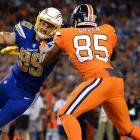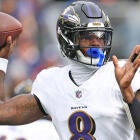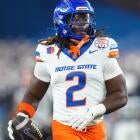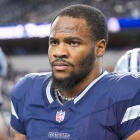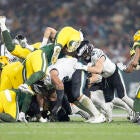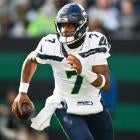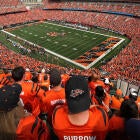It's Week 1 of the NFL season, and you, the veteran football-watcher, know exactly what that means: there's not one "Monday Night Football" game for your viewing pleasure this week, but two.
My colleague Sean Wagner-McGough has you covered with a preview for the early game pitting the New Orleans Saints against the Minnesota Vikings, which means I'm here with your preview of the late-night battle between the Los Angeles Chargers and the Denver Broncos -- 2017's one and only Monday night nightcap.
Before we get into the game preview, though, let's get in the mood for some Monday evening pigskin. Give me the MNF music.
The loser of this game will fall into the basement of the AFC West, while the winning team will move into a three-way tie atop the division with the 1-0 Kansas City Chiefs and Oakland Raiders. Both the Chargers and the Broncos sat at home while the Chiefs and Raiders went to the playoffs last season, so surely they will want to get off to a good start to avoid falling behind in the divisional race.
This promises to be a good defensive battle, with the Broncos having one of the NFL's best point-prevention units for several years running and the Chargers coming off a top-10 finish in defensive efficiency (as measured by Football Outsiders' defensive DVOA, which adjusts performance for down, distance, and opponent) and sporting star talents at all three levels of their defense. For reasons I'll get into below, I like the Chargers to come out on top in a low-scoring affair.
The prediction: Chargers 16, Broncos 10
How to watch, stream
- Kickoff: Sept. 11, 10:20 p.m.
- TV: ESPN (Check local listings)
- Streaming: fuboTV (Try for free)
1. Why points will be hard to come by
There were only 322 total points scored by the Broncos and their opponents in games played at Sports Authority Field at Mile High last season, an average of just 40.3 per game. There were also only 321 points scored in Denver in 2015, so things are pretty consistently low-scoring out there. Those figures work out to about 5.5 points less per game than you'd expect, given the season-long average of 22.8 points per game per team in each of the last two years.
As low-scoring as those games have been in general, though, Chargers-Broncos games have been even more so. The teams have averaged 36.8 combined points per game across their last four matchups, and the games have been absolutely littered with turnovers. Those four contests have featured 11 turnovers by the Chargers and nine by the Broncos, a combined five-giveaway-per-game average that far exceeds the NFL average of 2.9 per contest.
2. Advantage in the run game
When points are at a premium, an advantage can often be given to the team better positioned to run the ball against its opponent. Based on both personnel and performance from last season, that team is undoubtedly the Chargers.
Denver was one of the worst running teams in the NFL last season, averaging just 3.6 yards per carry as a team. The Broncos were stuffed behind the line of scrimmage on 21 percent of their runs last season, 21st in the league, and converted in power situations (third or fourth downs with two or fewer yards to go, and any goal-to-go situation inside the two-yard line) only 51 percent of the time, second-worst in the NFL. Meanwhile, in their final season in San Diego, the Chargers stopped opposing runs behind the line of scrimmage more often than all but three NFL teams, and though they were not successful at stopping teams in power situations, they did an excellent job of stuffing runs up the middle, where the strength of the Denver running game lies.
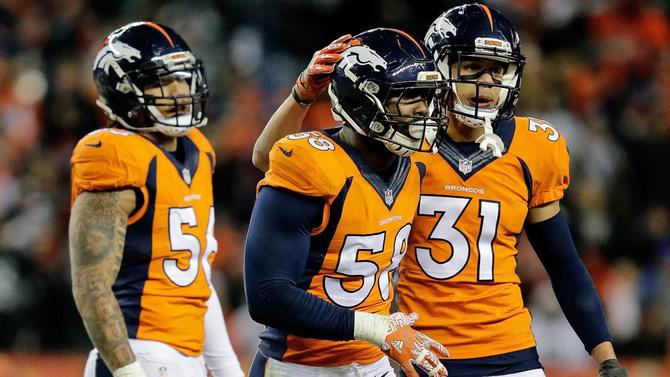
On the other side of the ball, the run game was actually the relative weakness in Denver's defense. The Broncos yielded an above-average 4.3 yards per carry, allowed conversions in 65 percent of power situations, and stuffed only 11 percent of runs behind the line. After losing defensive coordinator Wade Phillips (to L.A.'s other team), outside linebackers DeMarcus Ware (retirement) and Shane Ray (injury), and safety T.J. Ward (release), it's reasonable to expect them to take another step backward in that area. Melvin Gordon ran for 205 yards in two games against the Broncos last year, and carried 12 times for 55 yards in the one game he played against them as a rookie.
3. Rivers can get his groove back
It's true that Philip Rivers has struggled against the Broncos of late. Over his last four games against Denver, Rivers has completed only 77 of 146 passes (52.7 percent) for 875 yards (5.99 per attempt), five touchdowns, and five interceptions. That's "good" for a passer rating of just 68.1, which is obviously dreadful.
It's also true, however, that Rivers' No. 1 target, Keenan Allen, hasn't been on the field for any of those four games. Allen missed both 2015 contests after suffering a lacerated kidney in Week 8, and missed all but one half of one game of the 2016 season, tearing his ACL after posting six catches for 63 yards before halftime. Allen had 19 catches and three touchdowns against the Broncos in four games against them in 2013 and 2014. In those games, Rivers completed 85 of 131 passes (64.9 percent) for 868 yards (6.63 per attempt), seven touchdowns, and four interceptions. That works out to a significantly-better 88.9 passer rating that, while still short of Rivers' natural abilities, is pretty good against one of the NFL's best pass defenses.
With Allen back on the field, Rivers should see more success against the Broncos than he has over the last couple years.
Trevor Siemian, meanwhile, did not exactly distinguish himself as a rookie passer, and was only moderately effective against a San Diego pass defense missing its top cornerback for both matchups last year. Facing a defense with two top pass-rushers (Joey Bosa and Melvin Ingram), as well as Verrett, Casey Heyward, Jatavis Brown, and an improved safety group with the addition of Tre Boston and the return of Jahleel Addae, it figures to be tough sledding for Siemian again.
![[object Object] Logo](https://sportshub.cbsistatic.com/i/2020/04/22/e9ceb731-8b3f-4c60-98fe-090ab66a2997/screen-shot-2020-04-22-at-11-04-56-am.png)








